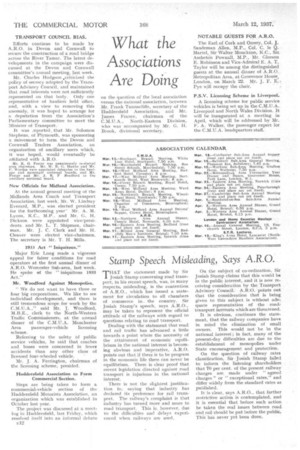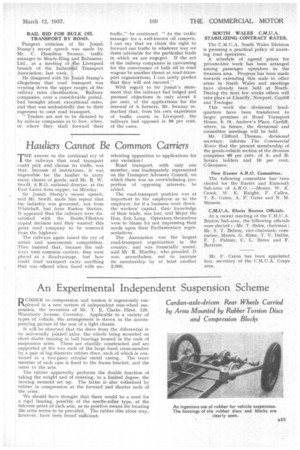Stamp Speech Misleading, Says A.RO.
Page 46

Page 47

If you've noticed an error in this article please click here to report it so we can fix it.
THAT the statement made by Sir
I Josiah Stamp concerning road transport, in his recent speech, was, in many respects. misleading, is the contention of A.R.O., which has issued a statement for circulation to all chambers of commerce in_ the country. Sir Josiah Stamp's speech, says A.R.O., may be taken to represent the official attitude of the railways with regard to questions relating to road transport.
Dealing with the statement that road and rail traffic has advanced a little towards a point where the necessity of the attainment of economic equilibrium in the national interest is becoming obvious and imperative, A.R.O. points out that if there is to be progress in the economic life there can never be equilibrium. There is clear proof that recent legislation directed against road transport is injurious in the national interest.
There is not the slightest justification fo.. saying that industry has declared its preference for rail transport. The railway's complaint is that industry has turned more and more to road transport. This is, however, due to the difficulties and delays experienced when railways are used. On the subject of co-ordination, Sir Josiah Stamp claims that this would be in the public interest, and it is now receiving consideration by the Transport Advisory Council. A.R.O. points out that the consideration that is being given to this subject is without adequate representation of the roadtransport interests which are threatened.
It is obvious, continues the statement, that the railway companies have in mind the elimination of small owners. This would not be in the national interest ; in fact, many of the present-day difficulties are due to the establishment of monopolies under State encouragement and protection.
On the question of railway rates classification, Sir Josiah Stamp failed to inform the listening shareholders that 70 per cent, of the present railway charges are made under " agreed charges " or " exceptional rates," and differ widely from the standard rates as published.
It is clear, says A.R.O., that further restrictive action is contemplated, and it is essential that before such action be taken the real issues between road and rail should be put before the public. This has never yet been done. RAIL BID FOR BULK OIL TRANSPORT BY ROAD. Pungent criticism of Sir Josiah Stamp's recent speech was made by Mr. C. Hamilton Swanzy, traffic manager to Meade-King and Robinson, Ltd., at a meeting of the Liverpool branch of the Industrial Transport Association, last week.
He disagreed with Sir Josiah Stamp's allegations that road transport was wearing down the upper ranges of the railway rates classification. Railway companies, over a considerable period, had brofight about exceptional rates, and that was undoubtedly due to their eagerness. to oust road transport.
" Traders are not to be dictated to by railway companies as to how, when, or where they shall forward their traffic," he continued. " As the traffic manager for a well-known oil concern, I can say that we claim the right to forward our traffic in whatever way we deem advisable for the particular trade in which we are engaged. If the act of the railway companies in canvassing for the conveyance of bulk oil in road wagons be another thrust at road-transport organizations, I can safely predict that they will not succeed."
With regard to Sir Josiah's statement that the railways had lodged and pursued objections in only about 3 per cent, of the applications for the renewal of A licences. Mr. Swanzy remarked that, from his own experience of traffic courts in Liverpool, the railways had opposed in 99 per cent. of the cases.




















































































